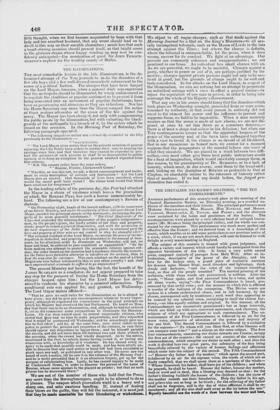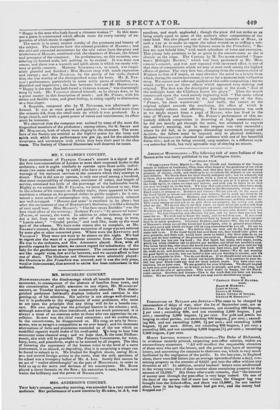THE CHEVALIER NEUKOMM'S ORATORIO, "THE TEN COMMANDMENTS."
ANOTHER performance of this oratorio took place at the meeting of the Classical Harmonists Society, 'on Thursday evening, to a crowded au- dience of the Members and their friends. The principal performers were Madame, STOCKHAUSEN, Miss MASSON, Miss Novam.o, and Messrs. VAUHHAN,. 1:I0RNCAUi.E, E. TAYLOR, and PARRY; and the choruses were _sustained by the ladies and gentlemen of the Society. The . accompaniments were played by a very efficient band of stringed instru-4 ments (Mr. MOati.ty being the principal violin), and the Whore was con- ducted by the compoer. This performance was much more perfect and effective than the fornier; and we derived from it a knowledge of the Music, which enables us to add'sdme particulars to our previous notice of a work, which, if we are not much deceived, will soon be listened'to with'
delight at every musie:meeting iii England. ' ' •
The subject of this oratorio is treated with great judgment; and affords a variety and interest which could hardly be anticipated from the apparent barrenness of the title. It forms a very noble sacred' poem, composed entirely of passages from Holy Writ. After an in- troduction, descriptive of the power of the Almighty, and his love for the human race, a grand piece of recitative narrates his descent upon Mount Sinai, amid. thunders. and lightnings, thick clouds and darkness, "and the voice of the trumpet exceeding loud, so that all the people trembled.", The musical painting of. the orchestra, while these words are pronounced, is sublime. After the. words, " Moses spake, and God answered him by a voice, and spake all these words, saying"—the First Commandment is heard, pro- nounced by that awful voice ; and the manner in which this is effected is worthy of the boldness of the conception. The Divine words are' spoken in a solemn ecclesiastical ..chant, and in full harmony, by the chorus, accompanied only by trombones ; each word thus _appearing to be uttered by one celestial voice, containing in itself the richest har.. mony,—an idea equally sublime and original. In this manner, all the Commandments are successively pronounced ; but at large 'intervals,' which are filled up with airs, concerted movements, and choruses,' the subjects of which are appropriate to each commandment. The ari-: nothicement of the First Commandment is followed by an air for the' tenor'. voice expressive of adoration of the power and .Majesti. of the one .GOd. The Second Commandment is followed by a recitative foi the soprano—" To whom will you liken*God, or what likeness will you compare unto him? " and a chorus on the same subject. The first' four commandments, containing our duties towards our Creator, occupy the first act of the oratorio ; the second act consists of the remaining commandments, which comprise our duties to each other : and thus the work is divided into two great parts, the solemnity of the first being. beautifidly relieved by the variety of human feelings and 'affections which enter into the subject of the second. The Fifth Commandment —" Honour thy father and thy mother," which opens the second part, is followed by an air for the soprano voice, the words of which are so finely compiled, that we shall quote them as a specimen of the whole--.' "Whoso honoureth his father, shall have joy of his children ; and when he prayeth, he shall be heard. Honour thy father, honour thy mother, both in word and in deed, that, a blessing may descend on thee: for the father's blessing buildeth the.honsis of the children ' - but the curse of the mother rooteth out their foUndatiOn. Help thy father in his'age, - and grieve him not as long as he liveth ; for the relieving of thy father shall not be forgotten, and in the day of thine affliction it shall be re- membered ; and all thy sins shall melt away as the ice before the sun." Equally beautiful are the words of a duet between the tenor and bass,
" Happy is the man who hath found a virtuous wornan !" In this man- ner a poem is constructed which affords room for every variety of ex- pression of which music is capable.
The music is in every respect worthy of the greatness and beauty of the subject. The choruses hafe the colossal grandeur of HANDEL ; and the airs and concerted movements for the solo voices have the grace and tenderness of Mozster, combined with the clearness of HAYDN, the friend and preceptor of the composer. Its performance, on this occasion, con- sidering its limited scale, left nothing to be desired. It was done con amore, and there was a warmth and spirit about it which we rarely wit- ness at public concerts. Madame STocKHACSEN, as usual, was exqui- sitely graceful and finished ; Miss Masan.; sang with much expression and energy ; and Miss Novxi.i.o, by the purity of her style, showed that she was worthy of the distinguished name she bears. Mr. E. TAY- LOR'S performance, particularly in some noble pieces of recitative, was dignified and impressive ; the duet between him and Mr. HORNCASTLE, " Happy is the man that bath found a, virtuous woman," was charmingly sung by both. Mr. VAUGHAN showed himself, as he always does, to be a great master in,this description of music ; and Mr. PARRY with his sweet and flexible voice, and great feeling, is rising rapidly to distinction as a bass singer. A Requiem, composed also by M. NEtTKOMM, was afterwards per- formed. It was at once grand and pathetic ; but suffered more than the oratorio did, from the small scale on which it was produced. In a large church, and with a great power of voices and instruments, its effect must be immense.
We observed that the composer was assisted by some of the most dis- tinguished members of the profession ; among others, Sir G. Samar and Mr. Moscamas, both of whom were singing in the choruses. The mem- bers of the Society are entitled to the highest praise for the taste and spirit with which this performance was got ,up, and for the admirable steadiness and correctness with which they bore their part in the cho- ruses. The Society of Classical Harmonists well deserves its name.



























 Previous page
Previous page